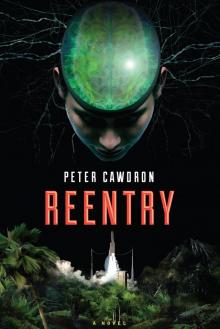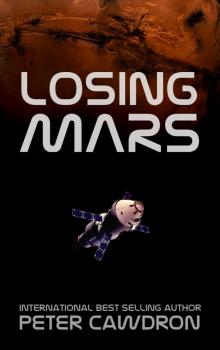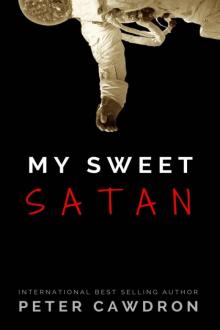- Home
- Peter Cawdron
3zekiel (First Contact) Page 3
3zekiel (First Contact) Read online
Page 3
“I can see what you’re doing.” My father is pissed. The veins on his neck are starting to bulge. He calls out over the sound of the helicopters buzzing overhead like a swarm of hornets. “Why?”
“We have four helos on station. Only two will stay with the team. We need to put them on the ground before they start sucking on fuel reserves.”
“But why?” Dad yells, as yet another helicopter passes low overhead. Rather than hovering, the helicopters are circling, shifting position, surveying the village from every angle. “You’re not answering my question.”
“No. I’m not.” The lieutenant turns toward another soldier running up beside him with a map. The two men point out features, discussing the clearing of the jungle. My father fumes. He’s not used to being sidelined.
Several of the village elders gather beside my dad, talking with him. Concern lines their weathered faces. The lieutenant points at them, still yelling over the noise of the helicopters flying overhead. “We’re going to need your help shifting those fallen trees. I need the ground cleared to five feet. Nothing above five feet so we can set these birds down.”
The village elders look to my father. Not all of them are Christian, but they all trust him. Religion and ideology aside, there’s no doubt his presence here has saved lives. I can see my father seething inside. His teeth are clenched, but he nods, looking to the chief. The village chief turns, waving with his hands and calling his men over. Above us, four helicopters sway just a few feet above the jungle canopy, thrashing the air. Branches sway as though caught in a storm. Leaves swirl in the wind.
The lieutenant marches over to the church, looking at it carefully. I’m not sure if he wants to knock it down or take it over, but he’s clearly evaluating his options.
“It’s the star, isn’t it?”
“Yes, Father Chambers. It’s the star. Now I need you to coordinate the natives. We have to clear this low-lying scrub—and quick. If we can’t flatten the area within the next sixty minutes the helos will be recalled.”
“Why should I help you?”
The lieutenant points up.
“Because I’m here to protect you from them.”
Nothing more needs to be said. My dad nods and moves off. He organizes the men of the village, explaining the urgency in cutting the undergrowth. A line of men spread out behind the SEALs, moving through the fallen jungle with machetes and long knives, hacking at the foliage.
I help some of the soldiers lift fallen trees, dragging them to one side. The trees are too heavy to carry, but by lifting one end, we can pivot, dragging the dense upper branches from where they fell, shifting the trunk out of the way. The villagers work with their machetes, hacking at the fallen branches, lowering the profile of the decimated trees.
“Stay close, kid.” Petty Officer Garcia grabs me, pulling me to one side as a ten-foot-long branch whips past just inches from my head, crashing into the undergrowth.
“Thanks.” I scramble to keep up with him. “It’s Joshua—Josh.” I extend my hand in friendship.
Petty Officer Garcia shakes my hand with an iron grip.
“You’re alright, kid.” I wish he wouldn’t call me kid. I’m not a child. If there’s one thing a teen wants, it’s to be grown up. There’s nothing worse than being caught in the middle and treated like you’re still a kid. He seems to sense some reticence on my part and ruffles my hair. Great, now I’m being patronized like a dog.
“Gum?”
That causes my face to light up. “Sure.” There’s something about the instant hit of sugar that comes from chewing gum. All is forgiven, Petty Officer Garcia.
The chainsaws being used by the SEALs are bigger and longer than anything I’ve ever seen. The blades are easily four foot in length and the stream of sawdust flying through the air behind them reaches ten to fifteen feet, sending wood chips cascading like water from a fountain, showering the bushes in tiny flecks. All the trees fall the same way, out in front of us. The precision with which the soldiers are attacking the forest dawns on me. The SEALs are laying the trees down between the various trees still standing ahead of them, avoiding them. Some of the fallen trees catch in the limbs and branches of other trees deeper within the jungle, but most fall clear, flattening the lower trees and bushes.
Several other soldiers have smaller chainsaws they brandish with one hand. They strip the trunks of various fallen trees, cutting down the debris rising above the jungle floor.
The noise is overwhelming.
Petty Officer Garcia and I join one of the teams lifting a fallen log. It’s hard work, but as I’m shorter than the soldiers, at times it seems as though I’m not lifting anything. Once we’ve swung the trunk around to the edge of the jungle, the soldiers give a count of three before tossing it into the foliage. If any of these logs were to land on someone’s feet, they’d crush them, bones and all. I’m sweating profusely in the heat but loving the work.
We clear enough ground for one of the choppers to land, and it descends with what feels like hurricane force winds, throwing tiny sticks and bits of debris at us. I turn my back to the chopper, but that doesn’t stop my legs and arms from being whipped by flying branches.
“Ouch!” My lower calf muscle erupts with pain, having been slashed by a loose branch hurled through the air. A thin line of blood seeps from my leg, but the injury doesn’t bleed as it is as fine as a razor blade. It stings like a paper cut.
“Makes you feel alive, doesn’t it?” Garcia yells as the rotors wind down on the chopper behind us. The whine of the engines dies and the wind drops.
I laugh, having never thought of pain this way.
“Sure. I guess.”
Garcia laughs as well, slapping me on the back.
Petty Officer Garcia is stocky, with broad thighs and a neck that seems to blend in with his shoulders. I doubt he’s carrying more than an ounce of fat on his body. He must be of Mexican descent, as his hair is jet black, while his skin has an oily sheen in the oppressive heat.
“You’re all right, Josh.”
“Thanks.”
The helicopter that landed behind us is considerably different from the one I saw Garcia descend from. He came out of a chopper with open sides and a soldier standing in the doorway mounting a machine gun. This helicopter, though, is longer and wider. Instead of soldiers, civilians begin climbing out, carrying crates and boxes.
The two military helicopters circling overhead depart, leaving only one more civilian chopper in the air.
Working with a machete is exhausting. We take turns slashing at the undergrowth while the village women bring us water and slices of millet cake. The ground is uneven, covered in rotten wood, thick vines and saplings. There’s a reason the natives haven’t expanded the village, and it’s not because of the work involved, or the astonishing rate with which competing plants try to repopulate the canopy. It’s insects. Flies, bees, wasps, spiders, leeches, beetles, termites, and millions upon millions of ants swarm over the foliage. For them, our intrusion is a declaration of war and they mount a counter attack. I’m not sure even the US Navy SEALs are equipped to deal with a nest of angry African ants.
Garcia slaps his neck and then his leg in a futile attempt to keep the insects at bay.
“Ouch!”
He hops to one side, peeling a large centipede from his arm. Roughly a hundred spindly legs clamber for something to hold onto, while the body of the creature curls, trying to find a stick or a branch to grab. Pinches snap at the air in anger, determined to inflict pain.
I can’t resist. “Makes you feel alive, doesn’t it?” And he bursts out laughing.
When I first arrived here from Boston, via Paris, and then Morocco, insect bites were torture—they’d burn for what felt like days. It was as though someone had stuck red-hot needles into my skin. Over time, I’ve developed an immunity to bites. They still hurt, but not nearly as bad, or for as long. I guess my body learned not to react.
“You need mud.” I pick up a handful and
rub it on my lower legs. “They’re not smart. They’ll think you’re a tree or something—not an animal. Plus, it makes it harder for them to bite you.”
Garcia rolls his trousers up to his knee, exposing his lower leg. Already, there are dozens of red welts. Ants clamber over his skin. He slaps mud around his calf muscle, working the rich, dark soil down into the top of his socks.
“Thanks, Josh. Good tip.”
I smile. Having American soldiers drop from the sky is the most exciting thing that’s ever happened around here, and suddenly the presence of an alien spacecraft tens of thousands of miles away seems all too close, and yet not so scary. The soldiers are invincible, or so it seems. We finish working on the clearing and the second helicopter descends, kicking up a hailstorm of dirt and debris. I’m surprised my father hasn’t forbidden me from working with the SEALs, but I suspect that’s because he’s distracted by other things.
Pretzel
The SEALs are smart. They cleared the exact center of the two landing spots with meticulous care, but only out to about twenty feet. Beyond that, they’ve left the foliage and trees where they’ve fallen. This allows the helicopters to set down on roughly level ground, with the debris out to about forty yards lying on top of itself in a chaotic jumble, but it’s well below the whirling rotor-blades. Negotiating the rough terrain on foot is difficult as fallen trees of various sizes crisscross the jungle floor despite the soldiers’ best efforts, but the SEALs got their helicopters down.
Garcia crouches, ducking under a thick trunk, while I clamber over it, pulling on branches for balance as we make our way to the second helicopter.
There’s no time to rest. The SEALs switch from clearing the jungle to carrying supplies and equipment from the choppers. It’s painstakingly slow work. We set up a line to ferry crates and backpacks over to the village. It takes another hour before the cargo is unloaded and by then I’m exhausted.
Petty Officer Garcia sits on one of the crates and takes a swig of water from a canteen, offering me some. Sweat soaks through his shirt.
“Thirsty?”
“Sure. Thanks.”
It feels nice to be part of the crew.
“Hey, Pretzel.”
Pretzel? For a moment, I’m not sure I heard Garcia correctly, but a thin, elderly man wanders over without a care in the world. He’s wearing a drab olive uniform that looks ungainly on his slight frame. I don’t know too much about the military, but I’m pretty sure this isn’t standard issue. Besides, he looks too old to be a soldier. His helmet is two sizes too big for his head and leans to one side, angling down over his right ear.
Pretzel smiles. “What the hell are they doing letting you near a goddamn alien UFO, Petty Officer?”
As soon as Pretzel speaks, I recognize his voice. This is the scientist we watched last night on television, although that was probably prerecorded. From his accent, it’s clear he’s from India but he’s at home with the US troops. Garcia just laughs at his comment.
“Pretz, this is Josh.”
“Hi.” I wave, unsure why I’m waving.
Pretzel salutes me, which given I’m not in the military, I’m pretty sure is a breach of etiquette—not that I care. Dad would, but not me.
“Pratul Arjun Khatri-Lagharin. Ex-British Gurkha. Quartermaster. At your service”
“Don’t let him fool you, kid. He’s a civvy.”
“Pra—who?” And it’s gone. Whatever his name is, it’s already escaped me.
“Pretzel, Josh. Just Pretzel.” He reaches out a friendly hand and we shake. I guess he gets that a lot, but no one messes up Pretzel.
“So, you’re one of the scientists?”
“I am,” he says proudly, taking off his helmet and resting it on a nearby boulder. His wispy hair is a mess and matted down with sweat, making it look as though he’s just finished running a marathon. I know stereotypes are misleading, but I was expecting lab coats and reading glasses, the rectangular kind that instantly make someone look more intelligent. If I bumped into Pretzel in a crowd, I’d think he was retired or perhaps worked as a reporter, maybe an editor at some newspaper, as he’s got that kind of gravitas about him.
Garcia says, “Pretzel’s been looking for intelligent life in outer space for over fifty years.”
To which, he replies, “Because there sure as hell ain’t any down here.” Both men laugh and I get the feeling this is a common retort.
Lieutenant Jackson barks orders at one of the soldiers on the other side of the crate and Garcia jumps to his feet, expecting to be scolded as well. Pretzel doesn’t seem fazed by the lieutenant’s gruff demeanor. In his distinctly irreverent Indian accent, he tells me, “Don’t worry about him. He’s a jackass.”
Jackson heard that—that much is clear from the way the lieutenant’s head pricks up as he wheels around to face us.
“What was that? What did you say?”
It’s not hard to see there’s history between them. Lieutenant Jackson is incensed.
Pretzel is surprisingly relaxed given he’s just been caught cursing at a US Navy SEAL. “I was just telling the kid,” he says, taking his time, waving with his hand and refusing to be intimidated by the lieutenant. “If he needs anything.” Again, he pauses, forcing Jackson to wait for his reply. The lieutenant is impatient, seething inside, but the aging Indian scientist speaks slowly, enunciating carefully as he says, “Just... ask.”
Jackson isn’t impressed. The lieutenant heard exactly what was said but he doesn’t challenge Pretzel, rather he turns away, pointing at several soldiers erecting a tent and barking orders at them. He flinches slightly as Pretzel hisses, adding a single word spoken with deliberation.
“Jackass.”
Garcia raises an eyebrow, looking at me to see if I followed what just happened. Oh, yeah, I got it. I can’t wait till Pretzel meets my dad. I’m going to need popcorn. Lots of popcorn.
Pretzel turns to me. “You need anything, kid?”
“Me?” I shake my head, offering an emphatic, “No.”
I’m still not sure how I ended up in the middle of all this.
“Well…”
I finish his sentence for him. “Just ask, right?”
“Haha. I like you, kid.”
“Come on.” Garcia gestures for me to walk with him. We make our way to the grounds around the church. As the compound is largely free of trees, the church lawn is used for markets on the weekend and is ideal for the scientists and soldiers setting up camp.
“So. Um. Pretzel?”
“Yeah, he’s quite the character, huh? He’s been working with the Rapid Deployment Team for decades. Don’t be fooled by his appearance. He has a Ph.D. in physics and astrobiology and is on the board of directors governing this mission.”
“But he and the lieutenant?”
“Don’t see eye to eye. Technically, they’re equals. In practice, Lieutenant Jackson has operational command, while Pretzel’s over the scientific team.
“We do a lot of training exercises, coordinating with NASA and ESA, preparing for precisely this kind of scenario. A couple of years ago when we were first assigned a support role with the Contact team, Lieutenant Jackson thought Pretzel was a Sherpa during an exercise in the Himalayas and tried to order him around. Tried being the optimum word. There’s been friction ever since.”
“No kidding.”
“Come on. I’ll introduce you to the crew.”
We walk past soldiers setting up vast bubble-shaped tents without a center pole. They’re surprisingly spacious inside, with vast flaps that open like doorways, allowing scientists to move in equipment from all four sides at once.
“What are they like?” I ask.
“The aliens? No one knows. But there’s been no hostility, so we’re assuming they’re good.”
There it is again—oversimplifications about good and evil, but after four years in the jungle, I know there’s no such distinction. As the villagers say, twilight never ends, the night just gets darker. What’s go
od is often subjective. Good for me might be bad for Jana. Good for her and me might be bad for the tribe, the village, or the jungle. I hope Garcia’s right, but I have my doubts.
“And they’re coming here?” Dumb question, I guess, as there’s no other reason for soldiers to drop out of the sky. It seems strange to me, crazy that aliens would want to come to my tiny village in the middle of the jungle. “Aren’t they supposed to go to The White House? Or attack buildings in New York or something?”
Garcia laughs. “Haven’t you heard? They’re lowering a rope—a cable.”
“A rope? From where?”
My eyes look up into the clear blue sky, not understanding how that’s possible.
“From space.”
“But won’t it fall down?”
“Nope.”
“What holds it up?”
“I dunno, but the scientists say it’s advanced engineering, not magic.”
“That’s mad.”
“Yeah, crazy, huh? They tell me it’s like having an elevator in a building, only there’s no building, and this elevator reaches thirty odd thousand kilometers into space. If it fell, it would wrap around the entire planet.”
“Wow! So what’s stopping it from falling?”
“Ask Pretzel.” As an afterthought, he points at the sky and adds, “Or them.”
“So there are no spaceships? No flying saucers? Just a rope?”
“I guess.”
Several civilians work on setting up a satellite dish outside the church. Pretzel unfolds a solar panel, locking it onto a stand and angling it toward the sun. He activates a tiny motor at its base, allowing it to track the motion of the sun over the course of the day.
Garcia points. “See those guys? They’re scientists from the NASA/ESA First Contact group—Pretzel’s team.”
I’m a little nervous around Pretzel, which is strange considering he’s overly friendly and outspoken. Soldiers mill around brandishing rifles. Somewhere overhead an alien rope ladder is being lowered from the clear blue sky and I’m intimidated by a five-foot six aging Indian scientist! Hilarious, really.

 Alien Space Tentacle Porn
Alien Space Tentacle Porn Reentry
Reentry Déjà Vu (First Contact)
Déjà Vu (First Contact) Wherever Seeds May Fall (First Contact)
Wherever Seeds May Fall (First Contact) But The Stars
But The Stars Trixie & Me
Trixie & Me Collision
Collision Jury Duty (First Contact)
Jury Duty (First Contact) Losing Mars
Losing Mars We Are Legion (van Helsing Diaries Book 2)
We Are Legion (van Helsing Diaries Book 2) Van Helsing's Diaries (Books 1-3): Nosferatu
Van Helsing's Diaries (Books 1-3): Nosferatu Shadows
Shadows 3zekiel (First Contact)
3zekiel (First Contact) Vampire (van Helsing Diaries Book 1)
Vampire (van Helsing Diaries Book 1) Xenophobia
Xenophobia All Our Tomorrows
All Our Tomorrows My Sweet Satan
My Sweet Satan Anomaly
Anomaly Monsters
Monsters